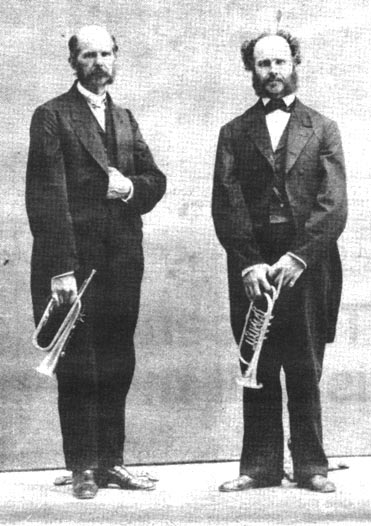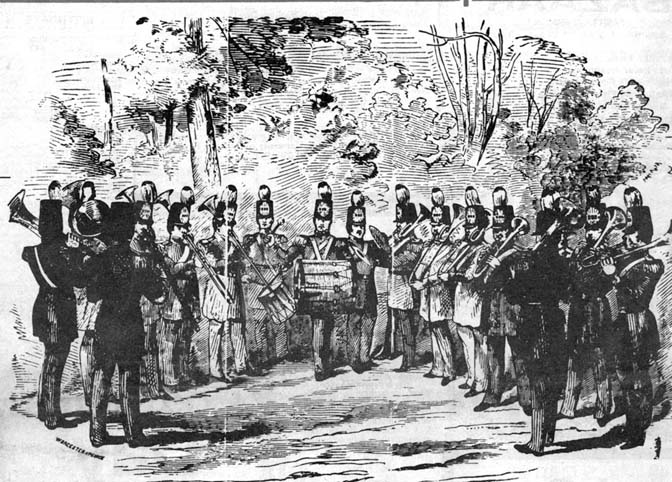The Hall Brothers

These two Lyme, N.H., natives became major figures in 19th century American band music. David C. Hall (left) conducted the Boston Brass Band from 1853 until the 1880s,and was an instrument maker and dealer. Rhodolph Hall (right) was a well-known clarinet and cornet soloist (Photo courtesy of the Lyme Historians Inc.)
David C. Hall and his brother Rhodolph grew up on a farm in Lyme, New Hampshire, where their large family had homesteaded since the late 1700s. First David (called D.C.) and then Rhodolph left the farm to work in an uncle’s stove factory in Hartford, Connecticut. There they worked all week for a salary of $2.12. In their spare time they joined the Hartford Brass Band. When band jobs began to pay more than the stove factory, both left the stove business to pursue careers in music. Some of the jobs described in their letters were steamboat excursions down the Connecticut River that paid $1.50 plus all you could eat and drink, and church parties and dances that paid as much as $4.00 per night—considerably more money and a loads more fun than putting cast iron stoves together.
A lot is known about the brothers because of a collection of 373 letters, and many clippings, programs, advertisements, dance cards, and photos found in a stamp dealer’s shop about 1940 by Frank O. Spinney, then president of Old Sturbridge Village. The collection was purchased by the Henry Ford Museum, Dearborn, Michigan in the 1970s. A transcription of the letters is available electronically from Bob Eliason, and an article on Rhodolph’s career will appear in the Journal of the American Musical Instrument Society volume 29 to be published in October 2003.
D.C. became leader of the Hartford Brass Band in 1844, the New Haven (Connecticut) Brass Band in 1846, and the Lowell (Massachusetts) Brass Band in 1849. From 1853 until the 1880s he was leader of the famed Boston Brass Band. After working with brass instrument maker J. Lathrop Allen for a year, D.C. started his own brass instrument making business in 1862. Many instruments from the 1860s and 1870s are signed “D.C. Hall” or “Hall & Quinby.” He played for dancing all over New England, took bands to Saratoga each summer, toured the country with circus bands, and for twenty years led bands on the New York City to Fall River, Massachusetts, steamers.
Rhodolph led the New Haven (Connecticut) Brass Band after his brother, then the Roxbury (Massachusetts) Brass Band for a few years. He also followed his brother to Lowell, Massachusetts. and was second leader and soloist with the Boston Brass Band beginning in 1853. He is known to have played flute, clarinet, keyed bugle, cornet, Ebor Corno (a valved alto brass instrument), trombone, violin, and even the penny whistle. He played with brass bands, dance bands, circuses, minstrel shows, bell ringers, and other concert ensembles and toured widely, including trips throughout the eastern and mid-western states, California, Cuba, Canada, and England. His career touched on the change from bands of woodwind and brass instruments to bands of all brass by the 1840s, and documents the shift from keyed bugle to cornet as the principal solo brass instrument. His letters also show that American brass bands formed in the 1840s and 1850s were sometimes well-paid professional organizations and that wind soloists were popular and well rewarded. A unique feature of his later performances was the use of a cornet with an echo attachment.
The bands the brothers played with were professional organizations that could provide music for any occasion. During the 1845 to 1875 period, concerts, fairs, exhibitions, target shoots and the like paid from $3.00 to $7.00; dances paid up to $12 per night; and excursions, July 4th celebrations, and parades as much as $17.00. Commencement exercises at Dartmouth College, Harvard, and Yale paid as much as $25. At the Dartmouth Commencement of 1847 Rhodolph played his first professional solo on an alto instrument called the Ebor Corno. For circuses and concert tours they received from $50 to $60 per month plus all expenses, and for traveling as a soloist Rhodolph made as much as $75 per week plus expenses for himself and his wife. This is at a time when wages for carpenters and masons on the Erie canal, a benchmark of the time, were $1.25 and $1.47 respectively per day, or $7.50–$9.00 per week.
During their careers both brothers were rewarded with fine instruments made of solid gold. D. C. was presented with a gold keyed bugle in 1850 by the Lowell Brass Band, and Rhodolph was given a gold cornet by his friends in 1866. Both instruments are now in the collections of the Henry Ford Museum.
This information is generously provided by Dr. Robert Eliason.
See also the Hall Letters — a collection of letters between the brothers and their family, edited by Dr. Eliason.

This woodcut of the band was published in Gleason’s Pictorial Drawing Room in the 1850s. The band was led by Lyme, N.H., native D.C. Hall from 1853 to the 1880s.
D.C. Hall was only one of a number of keyed bugle players who became famous. Ned Kendall, who started the Boston Brass Band, was another, and perhaps the strongest defender of the instrument when its eclipse was threatened by the popularity of the valve cornet which had become generally available by 1850.
Kendall and Patrick Gilmore (the great Irish-born American bandleader) engaged in a celebrated keyed bugle-cornet duel in the third quarter of the century which effectively ensured the future of valves and put keys in the past.
There are only a handful of people in the country today who are proficient at playing the keyed bugle, and Dr. Bob Eliason is one of only a few who are proficient on the ophicleide.
